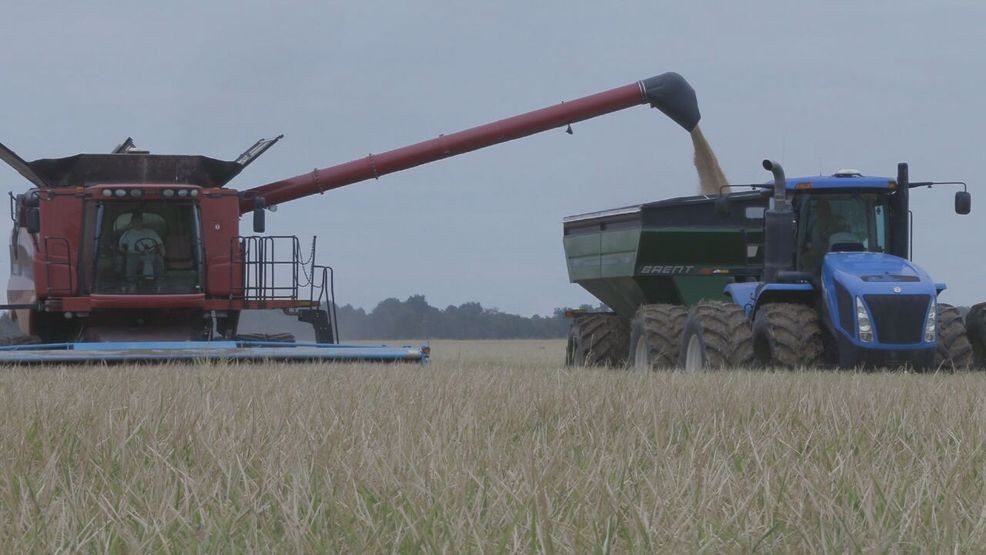LITTLE ROCK (KATV) — Arkansas farmers this year are facing the worst agricultural economy the country has seen in decades. It’s so bad that experts say as many as one-third of the state’s farms may file for bankruptcy or close altogether if conditions don’t improve.
Brad Peacock is a fifth-generation Arkansas farmer in White County. He started with 88 acres in 2012 and now rents and farms about 1,500 acres.
He doesn’t know if he’ll be able to farm another year without a miracle.
“When you look at legacy and you think, my family’s been doing this 100 years. Who am I to say that I can’t do this? I mean, when my great-grandfather was walking behind a mule, that was a hell of a lot harder than driving in an air-conditioned tractor. I mean, just the grit, the determination that the generations before me had. You weigh that like…am I the last?”
But grit and determination aren’t enough anymore. Farmers are now at the mercy of so many external forces that no matter how hard they work, no matter how good a crop they grow—it doesn’t matter.
Incessant rain and a flooding White River earlier this year cost Peacock a corn crop and several of his best fields. Add to that high input costs made worse by inflation, a dismal global market, and steeply dropping commodity prices, and it all means row crop farmers like Peacock have little chance of breaking even this year.
“So even if we cut the best crop, it doesn’t stop the price dropping tomorrow,” Peacock told KATV.
The last few years haven’t been kind to farmers either. Many have burned through their equity just to keep going. This season, Peacock has refinanced his farm equipment for the third time, and it’s the last time he can fall back on it.
“So then you refinance all the equipment again, and you’re paying eight to nine percent interest on it again for the third time,” Peacock said.
Thankfully, there may be a little light at the end of the tunnel. The “Big Beautiful Bill” contains long-overdue updates to outdated farm safety net subsidies, updates that should have come two years ago in a new federal farm bill.
“Our congressional delegation has done great. I mean, without them and the stuff they’ve done with the Beautiful Bill, there would be no hope. With those increases in that bill, that’s what’s giving guys the hope to go on, that if we can make it till then, we can make it,” Peacock said.
But the problem is, farmers won’t see any of those federal dollars until November of next year. And many won’t make it that long without emergency federal funding in the meantime, because most of their loans are due in February.
“That doesn’t do any good if you’re lowering those in February of 2026, and you can’t pay it off. Or you don’t have the equity to pay it off. Or at that point, if you do have the equity,” Peacock said, “do you refinance grandpa’s farm that he cleared the timber off of and has been farming since 1950?”
Seeing the scale of the crisis, Arkansas’ congressional delegation, led by Senate Agriculture Committee Chair Senator John Boozman, is working to secure emergency funding to help farmers survive until the updated safety net kicks in.
But it’s a race against time. Farmers are already filing for bankruptcy, and some who’ve farmed for generations are leaving the business altogether.
Peacock and his wife have a six-year-old son who already dreams of continuing the family legacy. But will he even get the chance?
“Last year at his kindergarten graduation they took videos of all the kids saying what they wanted to be when they grew up. You had ‘I want to be a cop,’ ‘I want to be a nurse,’ ‘I want to be a paramedic.’ And then you had him, and he said, ‘I want to be a farmer.’ And at that point you’re excited, but it scares you because you see the economic outlook. And as a father, as a good parent, you always want better for your children,” Peacock told KATV.
“When my son got on the combine a week or two ago, and he was climbing the ladder, the thought was—‘Is this the last time he’s going to climb that ladder? Is this the last year he’s going to climb that ladder?’”
